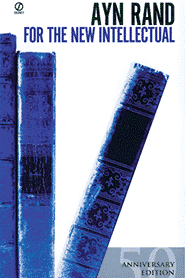

Following the publication of Atlas Shrugged, Ayn Rand transitioned to writing nonfiction philosophical works. The first book she published was For the New Intellectual, a collection of the philosophic speeches from her novels. The book begins with a lengthy essay in which Rand argues that America and Western civilization are in desperate need of a new philosophy and new intellectuals.
Rand viewed the book as a “cultural commercial” for her novels, which would stimulate sales of the newly released paperback editions of Atlas Shrugged and her first novel, We the Living. For the New Intellectualhas sold over 1 million copies.
— Ayn Rand, “Preface,” For the New Intellectual
In the lengthy introductory essay of For the New Intellectual, Rand argues that America and Western civilization are bankrupt, and that the cause of the bankruptcy is the failure of philosophy: specifically, the failure of philosophers and intellectuals to define and advocate a philosophy of reason.
In the subsequent selections, culled from her novels, Rand presents the outline of her philosophy of reason, which she calls Objectivism. These excerpts cover major topics in philosophy — from Objectivism’s basic axioms to its new theory of free will to its radical ethics of rational egoism to its moral-philosophic case for laissez-faire capitalism.
For the New Intellectual contains some of Rand’s most important passages on other philosophers, including Aristotle, Plato, Hume, Kant, Hegel and Nietzsche. Many of its selections also develop Rand’s unprecedented critique of altruism — the notion that our basic moral obligation is to live for others.
“The need for intellectual leadership was never as great as now. No human being who has a trace of personal worth can be willing to surrender his life without lifting a hand — or a mind — to defend it, particularly not in America, the country based on the premise of man’s self-reliance and self-esteem. Americans have known how to erect a superlative material achievement in the midst of an untouched wilderness, against the resistance of savage tribes. What we need today is to erect a corresponding philosophical structure, without which the material greatness cannot survive. A skyscraper cannot stand on crackerbarrels, nor on wall mottoes, nor on full-page ads, nor on prayers, nor on meta-language. The new wilderness to reclaim is philosophy, now all but deserted, with the weeds of prehistoric doctrines rising again to swallow the ruins. To support a culture, nothing less than a new philosophical foundation will do. The present state of the world is not the proof of philosophy’s impotence, but the proof of philosophy’s power.”
— Ayn Rand, “For the New Intellectual,” For the New Intellectual
Why do Rand’s novels contain often-lengthy philosophic speeches?
Because the speeches are crucial to the story: to advancing its plot and capturing the characters’ motivations. Rand’s goal as a fiction writer was to present her conception of the ideal man. But her view of good and evil differed so radically from others that she had to originate her own philosophy.
“I had to do it, because my basic view of man and of existence was in conflict with most of the existing philosophical theories. In order to define, explain and present my concept of man, I had to become a philosopher . . . .”
The speeches are “necessarily condensed summaries, because the full statement of the subjects involved is presented, in each novel, by means of the story. The events are the concretes and the particulars, of which the speeches are the abstract summations.”
Both together are needed to make her vision of the ideal real.
One of the chief virtues of Rand’s morality is justice, “the recognition of the fact that you cannot fake the character of men as you cannot fake the character of nature, that you must judge all men as conscientiously as you judge inanimate objects, with the same respect for truth, with the same incorruptible vision, by as pure and as rational a process of identification . . . .”
Rand herself was a crusader for justice, and the speeches from her novels capture this crusading spirit. In them one encounters, for instance, Rand’s denunciation of the fundamental evil of communism and all forms of collectivism; her celebration of and gratitude to the Atlases who have carried the world on their shoulders, unrecognized and unrewarded; her exposure and denunciation of the philosophic approach that has made their victimization possible; and her presentation of a new philosophical approach.
For the New Intellectual asks you to look at the world anew — and to judge accordingly.
In “The Meaning of Money,” Francisco d’Anconia’s speech excerpted from Atlas Shrugged, Rand challenges the platitude that money is the root of all evil.
Money, Rand argues, is made possible through production, and is a tool used by producers to facilitate win/win economic transactions. “To trade by means of money is the code of the man of good will. Money rests on the axiom that every man is the owner of his mind and his effort. Money allows no power to prescribe the value of your effort except the voluntary choice of the man who is willing to trade you his effort in return.”
But, Rand notes, money can be pursued in the wrong way. It is, she says “only a tool. It will take you wherever you wish, but it will not replace you as the driver.” Money is good — but only for the moral man.
Rand’s entire philosophic enterprise can be seen as an answer to the question: What makes human life possible?
Rand does not equate life with momentarily avoiding death. To be alive, for a human being, is a long-range enterprise, and it demands an ever-increasing vitality which Rand sees as the product, fundamentally, of using one’s mind to the fullest. “Man’s life, as required by his nature, is not the life of a mindless brute, of a looting thug or a mooching mystic, but the life of a thinking being — not life by means of force or fraud, but life by means of achievement — not survival at any price, since there’s only one price that pays for man’s survival: reason.”
This, for Rand, constitutes the standard of morality: “All that which is proper to the life of a rational being is the good; all that which destroys it is the evil.”
In For the New Intellectual, Rand submits our conventional notions of good and evil to rigorous challenge. In the process, she asks questions no one has ever asked and argues that the championing of selflessness and sacrifice reveals a morality geared to death.
From “This Is John Galt Speaking”:
“Why is it moral to serve the happiness of others, but not your own? If enjoyment is a value, why is it moral when experienced by others, but immoral when experienced by you? If the sensation of eating a cake is a value, why is it an immoral indulgence in your stomach, but a moral goal for you to achieve in the stomach of others? Why is it immoral for you to desire, but moral for others to do so? Why is it immoral to produce a value and keep it, but moral to give it away?”